Talk with Mozart
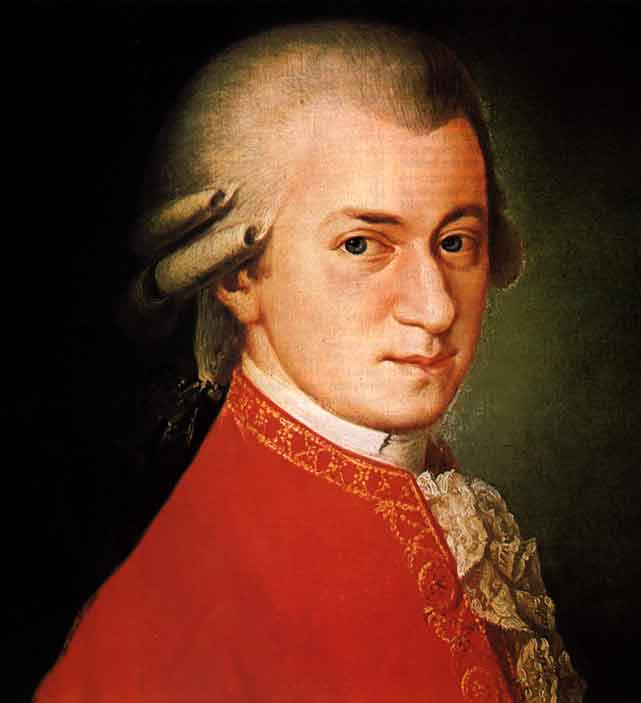
(moza01.jpg)


(moza00.jpg)
Hello, Diane ... how are you?

Wolfie! ... What a suprise! ... How come you show up like this?
Well ... Kato told me that you would like to see me.
Did he tell you that?
Yes, he did. Besides, Kato asked me to list up the three most popular pieces of my work to entertain you.
So, Wolfie, you're gonna show me your most popular pieces, huh?
Yes, I am. The best of all is "Ave verum corpus (K618)."

I wrote this piece for Anton Stoll, a friend of mine, who conducted the choir in Baden where my wife, Constanze, took the waters in his last months. For the feast of Corpus Christ in July 1791, I wrote this motet.

I know... 'cause this is the most famous single piece of church music you wrote.
Do you really think so, Diane?
Yes, I do.
Well ... I thought you would like it.
What made you think so?
'Cause you're a daughter of a clergyman.
How do you know?
Kato told me so.
He's got a big mouth, hasn't he? ... Well ... I like "Ave verum corpus" 'cause it blends the simplicity of your late style with a contained chromaticism. It does not sound at all sickly, though it undoubtedly is the source of many subsequent pieces that do.
Diane, you seem to know a lot about my works, don't you?
My piano teacher talks a lot about you and your music pieces. How about the second most popular piece?
It is "Claeinet Concerto in A (K622)"

I completed this piece in the fall of 1791 for Anton Stadler, another friend of mine, who pioneered the use of basset clarinet, with an especially low range that extended the bottom of the instrument by a third. I respected and admired the way of his play. Never would I have tought that a clarinet could be capable of imitating the human voice as deceptively as it is imitated by Anton Stadler. So I wrote the above piece for Stadler. How do you like it, Diane?

Oh, I like it 'cause its melody breathes a spirit of serenity and of resignation that seems entirely in tune with your spirit in the last years. Wolfie, tell me the third most popular piece.
It is "Eine kleine Nachtmusik (K525)."

I love this one most among all your works.

Oh, do you? I'm glad you like this piece. To tell you the truth, this is one of my favorites.
Is it? Nobody knows why you composed the above piece. Tell me, Wolfie, why on earth you created the "Little Night Music"?
Good question, Diane! I completed "Eine kleine Nachtmusik" on August 10, 1787.
If I remember correctly, your father died on May 28, 1787, didn't he?
That's right. I was so depressed at my most beloved father's death that I didn't know how I could overcome it. You see, my father had been my teacher and mentor. Without him, I wouldn't have become a gifted composer at all.
So, the "Little Night Music" has something to do with your father's death.
No, not really.
Wolfie, I don't mean to be rude, but I don't like a roundabout talk. Just tell me why you composed the "Little Night Music."
Well ... although I loved my father more than anybody else, he objected dating with my first love---17-year-old Aloisia Weber, who was a fine singer and daughter of the promoter at the Mannheim court theatre. I was twenty-two at the time.
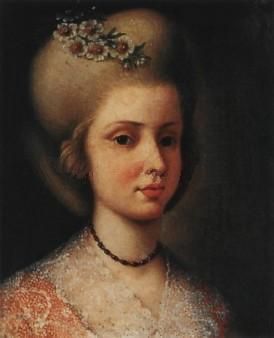
(moza14.jpg)

So you composed the "Little Night Music" for Aloisia Weber, didn't you?

Not at the time, but I had to think about her so that I could pull myself out of the abyss of the depression and misery when my father died.
I see ... So, Wolfie, you did your best to cheer yourself up while dreaming of Aloisia, huh?
That's right.
No wonder you did a superb job in completing the piece. I think the "Little Night Music" is the most successful serenade ever written, and certainly features in any "top ten" list of your works.
Do you really think so, Diane?
Yes, most definitely I do. Its virtues are utter simplicity, memorability and perfect balance. Its initial fanfares and melody indelibly remain in the mind, though really no different from those in so many other openings of your pieces. By the way, I've got one more question.
What is it?
In October of 1762, when you were six years old, you were invited to the palace at Schönbrunn in Austria, right?
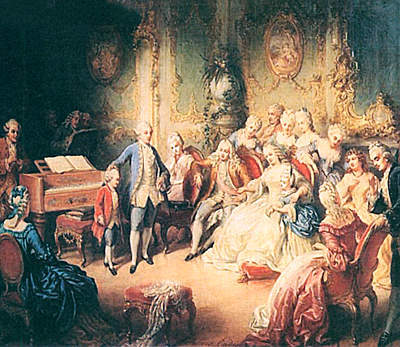
(moza08.jpg)

Yes, I was.

At the palace, you met Marie Antoinette, who was a year older than you. Marie and you were getting along quite well, and you were playing with the princess, and slipped on a polished floor. Bursting into tears, you were picked up and comforted by the seven-year-old Marie Antoinette. Then you kissed the future queen of France, and said "You're nice. I'll marry you when I grow up."
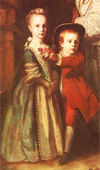
(moza09.jpg)
Mozart & Marie Antoinette

Oh, rubbish! I didn't say that. One of the story-tellers made up such a dumb tale, I suppose.

But I saw the movie: "Amadeus."
"Amadeus" Trailer

I enjoyed this hilarious movie to the hilt.

Diane, this movie is based on a short 1830 play by Alexander Pushkin called "Mozart and Salieri," in which Salieri poisoned me to death, which wasn't true at all.
But the movie is so funny.
Diane, you like funny movies, eh?
Amadeus - Funny Parts

This is far from the true story. I look so stupid and unsensible, don't I?

But I like the movie.
Diane, I'll tell you what... Don't see the above movie again. Instead, watch the following piano concert so that you could improve your playing skill.
Piano Concerto
No. 21 - Andante

Wow! I love it. For the same token, I love the above movie as well.

Diane, you shouldn't see senseless, rubbish movies. You'd better practice the piano so that you would be able to play the above concerto for me someday.
Well ... I don't know, but maybe I'll try. By the way, how come Aloisia refused to marry you?
I've been through most difficult times and now come to know that she was an extremely realistic woman.
So, Wolfie, at the time you thought she was rather a romantic daydreamer, didn't you?
Yes, I did. I was a young man with a frivolous and pleasure-seeking Bohemian. But she turned out a realist. At the time, I was seeking a better position such as a music director, you know. She didn't like my being fooling around without any fixed income.
But later you became quite successful, didn't you?
Yes, you're telling me, Diane. However, her mother wanted Aloisia to marry Joseph Lange, who was later to paint me in the best portrait.
How come Madame Weber prefer Joseph Lange?
'Cause he promised her a substantial annuity in the marriage settlement. Ironically, the payment subsequently reduced Lange to penury.
So, at the time you were a poor young man, weren't you? And Madame Weber and Aloisia chose the wealthy actor-artist.
That's right. Later, my financial situation, a source of extreme anxiety in 1790, finally began to improve. My wealthy patrons in Hungary and Amsterdam gave me annuities in return for the occasional composition. I also benefited from the sale of dance music written in my role as Imperial chamber composer.
Aloisia didn't change her mind, did she?
Even if she had changed her mind, she would've had no choice 'cause she was already married to Joseph Lange.
Then your interest shifted to the third Weber daughter, Constanze, didn't it?
No, not really. I was still attached to Aliosia emotionally and spiritually.
Why is that?
You see, Diane, I was so much inspired by her lovely image and character. She was my inspiration so that I could write the following seven pieces for her.
K.294
K.316
K.383
K.416
K.418
K.419
K.538

Did you write the above pieces even after Aloisia got married to Lange?

Yes, I did.
So, courtship did not go entirely smoothly with Constanze, did it?
No, it didn't ...'cause Constanze got mad and jealous since I did write several pieces for Aloisia---her older sister.
I see... Now I know why you and Constanze briefly separated in April 1782.
Besides, I had another problem and faced a very difficult task in getting my father's permission for the marriage to Constanze.
Why is that?
I was staying with the Weber family. As you see, Madame Weber was a dominant figure, and my father thought I was forced to marry Constanze.
Did Madame Weber really force you to marry Constanze?
Oh no, she didn't. Anyway, Constanze and I were finally married on 4 August 1782 in St. Stephen's Cathedral, the day before my father's consent arrived in the mail.
By the way, Wolfie, you were quite successful in your later years. But you were deep in debt and died poor. Why is that?
Good question, Diane. I know many people are puzzled by my financial trouble immediately before my death. Well ... Constanze often visited Baden for treatment of her infected leg or child birth and frequently spent quite a bit of money on gamble.
But, Wolfie, I heard that you were the one who enjoyed extravagant lifestyle---expensive furniture, a riding horse, a coach, elegant clothing, as well as your costly passion for billiards.
That's true to a certain extent when I was young. However, I was aware of my fiancial problem in later years. So I became rather frugal. On the contray, Constanze became careless for that matter. And I often asked her to sort out various financial problems.
According to your correspondance with your wife, however, Constanze remained silent.
This is because she later burned out her unfavorable letters.
Is that right?
Yes, Constanze destroyed all the evidences for my biographers so that people would think my extravagant lifestyle was the culprit. In any case, what is done is done, you know. It is no use crying over spilt milk. So, why don't we talk about the bright side of my life? Diane, I'm here to entertain you. Here's my music present for you.
What is it?
Listen to this.
Aaron Kurz:
Rondo alla Turca by Mozart
at Salle Cortot/ Paris

Oh, how lively and cheerful ... I love it.

Do you? I'm glad you like it. I wrote it for you, Diane.
Nobody believes it, but anyway it's nice talking with you.
My pleasure! I hope we'll see each other soon.

【Himiko's Monologue】

Wow!
I like the above concertos and songs, but I'd rather enjoy one of Mozart's operas.
Which one? --- you may ask.
Well, I like the "Marriage of Figaro."
The Marriage of Figaro
(Le nozze di Figaro)【Part I】
In any case, I hope Kato will write another interesting article soon.
So please come back to see me.
Have a nice day!
Bye bye ...


Wow!
I like the above concertos and songs, but I'd rather enjoy one of Mozart's operas.
Which one? --- you may ask.
Well, I like the "Marriage of Figaro."
The Marriage of Figaro
(Le nozze di Figaro)【Part I】
In any case, I hope Kato will write another interesting article soon.
So please come back to see me.
Have a nice day!
Bye bye ...


If you've got some time,
Please read one of the following artciles:

■"Diane Chatterley"
■"From Canada to Japan"
■"From Gyoda to Vancouver"
■"Film Festival"
■"Madame Taliesin"
■"Happy Days"
■"Vancouver Again"
■"Swansea"

■"Midnight in Vancouver"
■"Madame Lindbergh"
■"Dead Poets Society"
■"Letters to Diane"
■"Taliesin Studio"

■"Wright and Japan"
■"Taliesin Banzai"
■"Memrory Lane to Sendai"
■"Aunt Sleepie"
■"Titanic @ Sendai"
■"Birdcage"

(sylvie121.jpg)
■"Roly-poly in the wild"
■"Silence is dull"
■"Zen and Chi Gong"
■"Piano Lesson"
■"Dangerous Relation"
■"Electra Complex"

(juneswim.jpg)
■"Covent Garden"
■"Fatal Relation"
■"Notre Dame"
■"Anne Frank"
■"Biker Babe"
■"Diane Girdles the Globe"
■"Diane in Casablanca"
■"Infidelity Neighbourhood"
■"Forest Bathing"
■"Enjoy Ramen!"
■"Sex, Violence, Love"
■"Halifax to Vancouver"
■"A Thread of Destiny"
■"Fujiyama Geisha"

■"Beaver Lake"
■"God is Near!"
■"Holy Cow@Rose Garden"
■"Vancouver Earthquake"
■"Birthplace"

■"KIFF"
■"You Love Japan, eh?"
■"Eight Bridges"
■"First Love"
■"Fright on Flight"
■"Boy's Movie"
■"From Summer to Eternity"
■"Sōseki & Glenn Gould"
■"Dream Dream Dream"
■"In Search of Your Footprint"
■"Little Night Music"
■"Merry X'mas"
■"Happy New Year!"
■"Long live Diane!"
■"Mona Lisa"
■"Flu Shot"
■"Selfish TD Bank"


Hi, I'm June Adams.
Mozart's physical appearance was described by tenor Michael Kelly.
Kelly wrote that Mozart was "a remarkably small man, very thin and pale, with a profusion of fine, fair hair of which he was rather vain".
As his early biographer Niemetschek wrote, "there was nothing special about [his] physique. [...] He was small and his countenance, except for his large intense eyes, gave no signs of his genius."
His facial complexion was pitted, a reminder of his childhood case of smallpox.
There is a photofit of Mozart, created from four contemporary portraits.
He loved elegant clothing.
Kelly remembered him at a rehearsal: "[He] was on the stage with his crimson pelisse and gold-laced cocked hat, giving the time of the music to the orchestra."
Of his voice his wife later wrote that it "was a tenor, rather soft in speaking and delicate in singing, but when anything excited him, or it became necessary to exert it, it was both powerful and energetic."
After all, he seemed to be a powerful and energetic man, didn't he?
If you want to know more about Mozart, please read the following books.
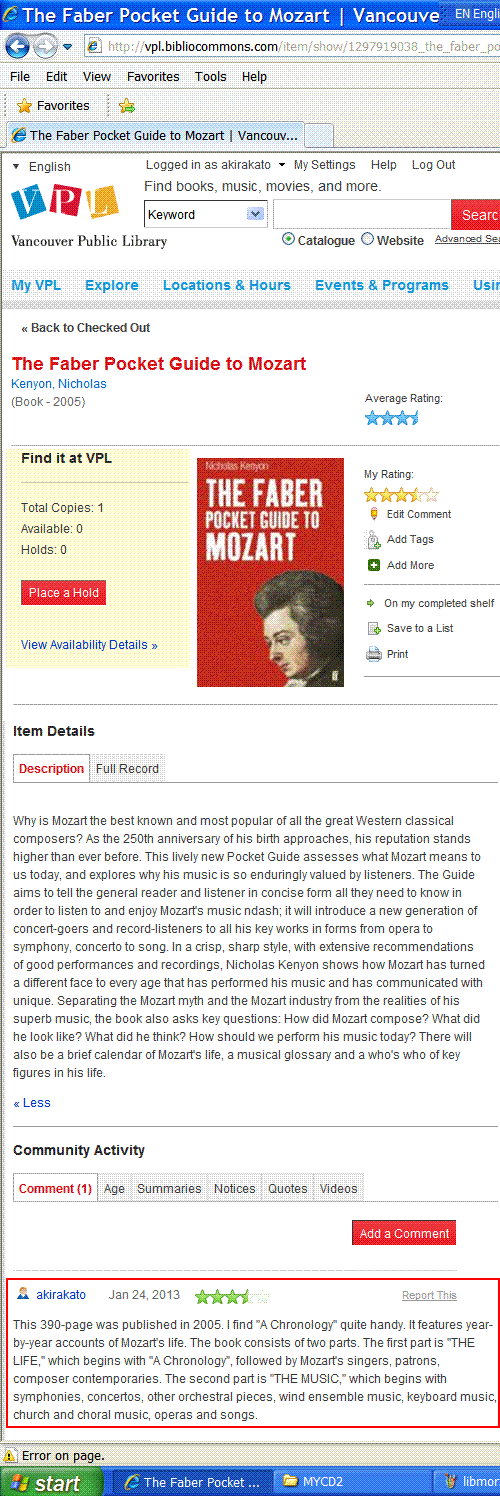
(libmorz1.gif)
■"Actual Catalogue Page"
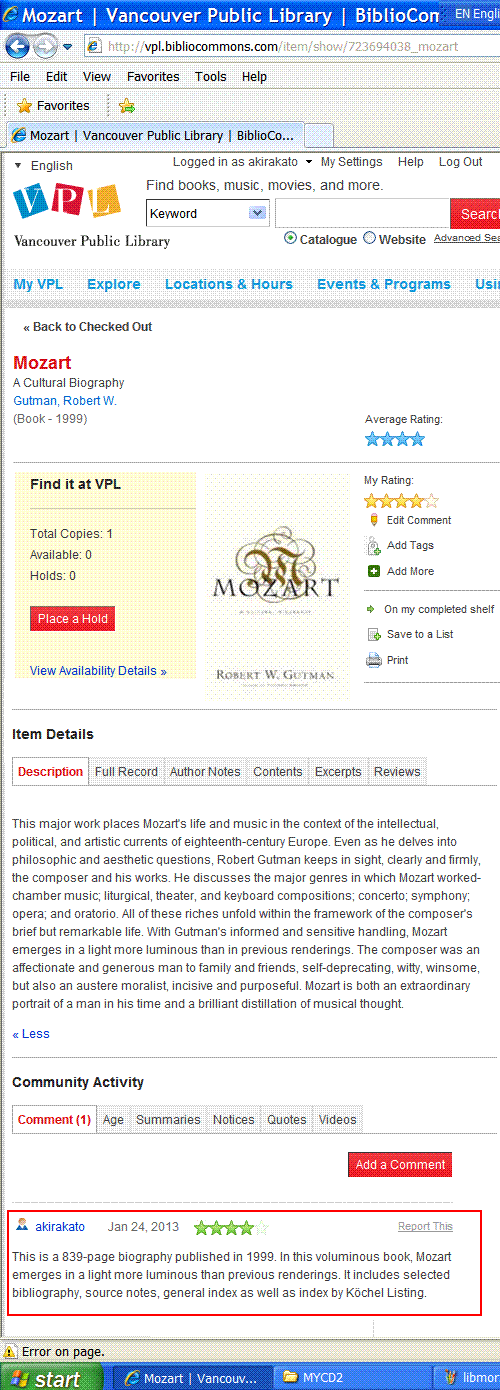
(libmorz2.gif)
■"Actual Catalogue Page"
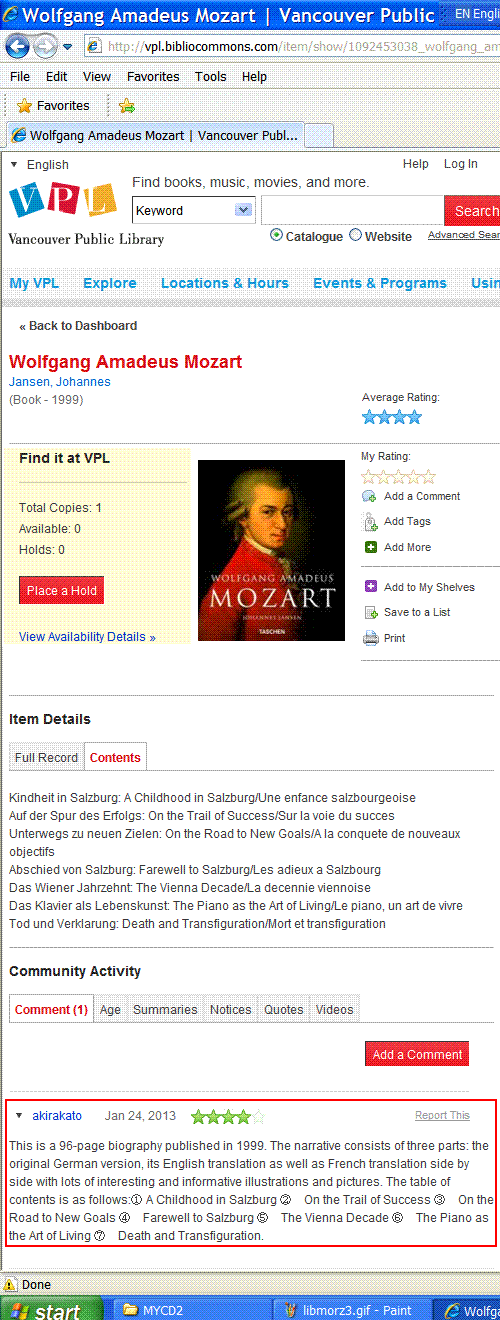
(libmorz3.gif)
■"Actual Catalogue Page"
If you live in Vancouver, you can reserve and borrow the above books by clicking the links.

ところで、愛とロマンに満ちた
レンゲさんのお話をまとめて
『レンゲ物語』を作りました。
もし、レンゲさんの記事をまとめて読みたいならば、
次のリンクをクリックしてくださいね。
■『愛とロマンのレンゲ物語』

■『軽井沢タリアセン夫人 - 小百合物語』
とにかく、今日も一日楽しく愉快に
ネットサーフィンしましょうね。
じゃあね。







0 件のコメント:
コメントを投稿